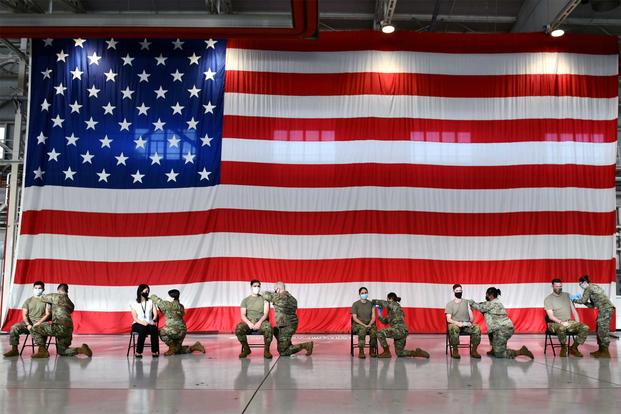Five days. That's how long the country had for a bit of peace and quiet to start 2021 before the events of Jan. 6 upended our democracy and kicked off a year that once again was shrouded in the continuing coronavirus pandemic.
The riot at the U.S. Capitol was just the warmup for a year that included the end to the 20-year war in Afghanistan, which had claimed the lives of 2,461 service members and marked a generation of troops.
With those events in mind, here's an unranked list of the Top 10 stories written by Military.com this year.
What Happened to Members of the Military Accused of Storming the Capitol on January 6?
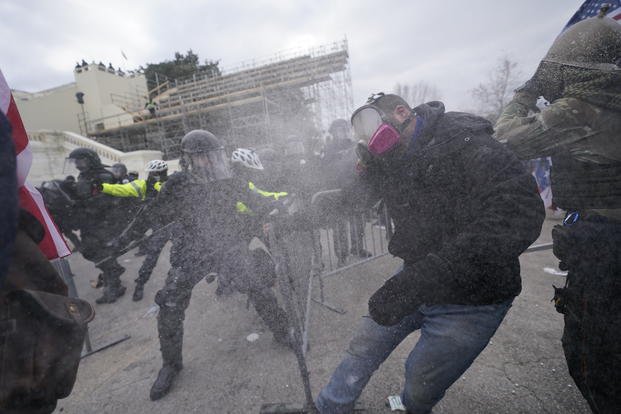
Almost a year after the storming of the U.S. Capitol by supporters of then-President Donald Trump in a move to stop the certification of the presidential election and halt the peaceful transfer of power, there are still a lot of unanswered questions.
But chief among those for the military community is how the services are penalizing those who took part in an attack against the country they vowed to serve. This in-depth investigation looked at what has happened to the careers of the five service members charged with having participated in the riot.
It was part of the broader issue of how the Pentagon is grappling with extremists within the ranks, and Military.com has continued to track what has happened to service members involved with Jan. 6, from those investigated to a service member whose commander and peers wrote letters to a court trying to limit the soldier's sentence and allow him to stay in the Wisconsin National Guard.
Pentagon Tracking 14 Cases of Heart Inflammation in Troops After COVID-19 Shots
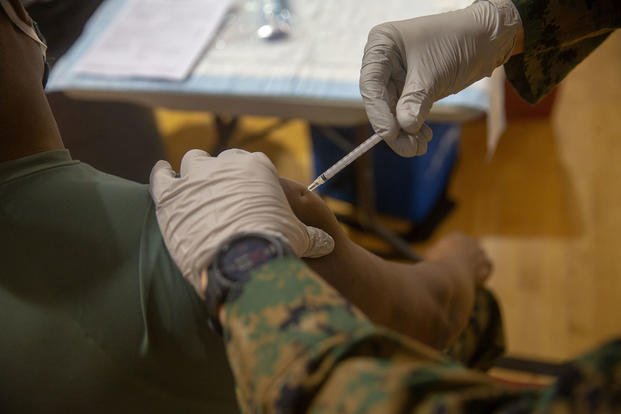
The ongoing pandemic has reshaped American life for nearly two years, but the arrival of COVID-19 vaccines ushered in a new discussion about the military's long history of mandatory vaccines. Military.com was the first site to report on a rare reaction some service members (including a Military.com reporter) were experiencing after receiving the vaccine.
But the broader problem of how the Pentagon would convince service members to get the shot became a constant theme after Secretary of Defense Lloyd Austin signed an order in August mandating that all troops get vaccinated. Each branch has developed its own timeline, but refusal to get the vaccine or follow other coronavirus protocols has put thousands of troops at risk of being booted from military service.
Escape from Afghanistan: One Interpreter's Desperate Run Past the Taliban to Safety
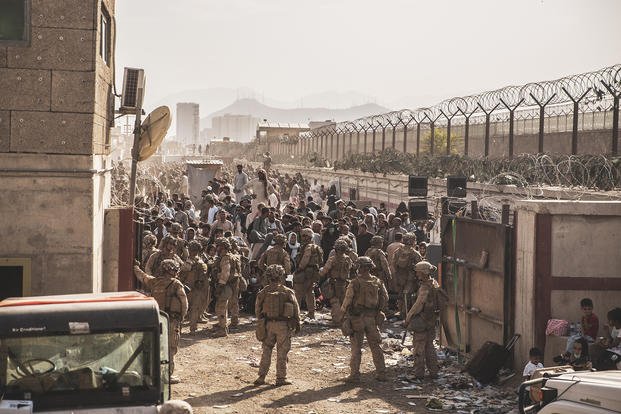
The withdrawal from Afghanistan, an abrupt end to two decades of conflict that saw an urgent evacuation as the Taliban conquered the country in mere weeks, might well be the most important story of the year. The sacrifice made by thousands of service members, those who lost their lives and those who continue to bear the physical and mental scars of their service, was being evaluated again in the face of a lost war.
The disastrous conclusion of the U.S. presence in Kabul saw thousands of desperate Afghans trying to flee to safety. One Military.com reporter inadvertently became part of that story, taking a phone call from a Marine who was staring at an interpreter desperate to get his family to safety.
"Are you able to vouch for [Said]?" the Marine, standing at the gates of Kabul's airport, asked. It was one of countless stunning stories that summed up the conclusion to the war.
That conclusion also caused many to reassess their own careers, both those who saw combat in Afghanistan and those who didn't.
Anger over Afghanistan and the Imperfect Example of Stu Scheller

The deep anger at what had just unfolded in Afghanistan reverberated throughout the military community. And that anger was personified by Lt. Col. Stu Scheller, a Marine who rose to social media stardom through a series of videos in which he called out military leadership for allowing the collapse of the Afghan government and the conquest of Afghanistan by the Taliban that led to the horrific evacuation scenes.
Scheller quickly ran afoul of his own command when he continued posting videos despite being ordered to stop, and his punishment and detention became a focal point of anger for some in the military community.
Military.com covered a hearing meant to determine Scheller's punishment, but also looked at the bigger picture of what he represented to many -- a focal point for their frustration over the end of the Afghanistan war, but an imperfect Marine.
Our Next War in Afghanistan Is Already Looming. And It May Be Even Harder.

Almost immediately after U.S. troops withdrew from Afghanistan, officials began to point to the risk of terrorist groups gathering in the country, suggesting that American forces might need to strike again.
Trying to grapple with what could cause America to return to combat in a country that had just drawn blood from service members for two decades is a difficult task, but Military.com looked at the coalescing forces that could force military leaders to act.
Other hot spots also drew attention, as Ukraine and Taiwan look to be stuck between the U.S. and near-peer powers with military planners bracing for a new era of competition.
'They Choose Not to Listen': Thae Ohu Speaks for the First Time on Her Experience in the Marines

While major geopolitical changes are underway, the military is dealing with its own shifts, including a long-needed reckoning with how the services handle sexual assault and mental illness.
Thae Ohu, who embodied lapses in how the Marine Corps handled both and whose case shot to national media attention, spoke to Military.com about her struggles in the service.
A range of reforms are underway, from congressional action to policy changes in the services, but having Ohu tell her story herself helped show the impact of the lack of support from the services.
"I cared enough to be in uniform to make sure that I did my job every single day, regardless of my appointments, regardless of my mental state, but I needed them to be more understanding and willing to accept the fact that I needed help too," she said.
Errors Cost Student Vets GI Bill Benefits. Now, Howard University Is Scrambling to Save VA Funding

The GI Bill is one of the most effective benefits programs in American history, helping to provide educational opportunities for vets that shape careers. But that doesn't mean it always works perfectly, especially when institutions don't prioritize veterans' needs.
Military.com investigated tips from sources of systemic issues at Howard University that led to students not receiving their GI Bill benefits, and in one case potentially losing housing, all tied to paperwork mistakes by the school.
Two weeks after Military.com published its investigation, the university official responsible for managing benefits left his position.
Howard University isn't alone in its issues with the GI Bill. Military.com found similar issues at play at the Massachusetts Institute of Technology.
The VA Said It Would Cover Gender Affirmation Surgeries. Trans Vets Are Still Waiting.

For transgender vets, the last few years have been a whirlwind. The Obama administration pushed policy changes that began to offer transgender vets some medical support through the VA, but with the election of Donald Trump in 2016, most of those benefits were put on hold as Trump decreed that trans Americans would no longer be allowed to serve in the military.
With the election of Joe Biden, advocates had been hopeful that benefits would become available quickly, and over the summer the VA announced that it would be offering support for gender affirmation surgeries.
But for trans vets, the continued wait is heartbreaking, and advocates point to real risk for those awaiting support given shocking figures on self-harm. The cost for caring for trans vets, something that opponents have pointed to as a rationale to refuse care, has thus far totaled only $15 million over the last five years, Military.com reported.
'Dirty, Embarrassing Secret:' Veterans with PTSD Struggle to Shed Stigma of Bad Paper Discharges
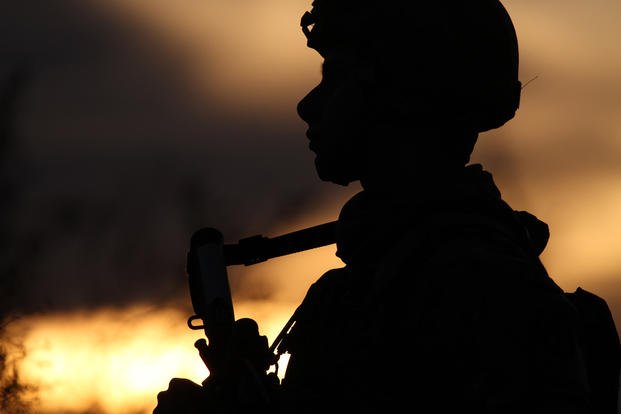
Generations of veterans have struggled with PTSD, but it's only in recent years that the services and the VA have begun to try to offer help in earnest. Those years lacking support, however, have left thousands of veterans who have suffered from PTSD with "bad paper" discharges that prevent them from receiving VA benefits.
Many turned to substance abuse to self-medicate as they dealt with PTSD, and many were separated from service due that abuse.
Military.com spoke with several of these veterans about their experiences and about their struggle to get help and difficulty finding jobs.
"Not many employers really look at veterans in a positive light unless you have an honorable discharge for work purposes," one veteran said.
Army Women Are Being Harangued over Hair as Superiors Ignore New Rules
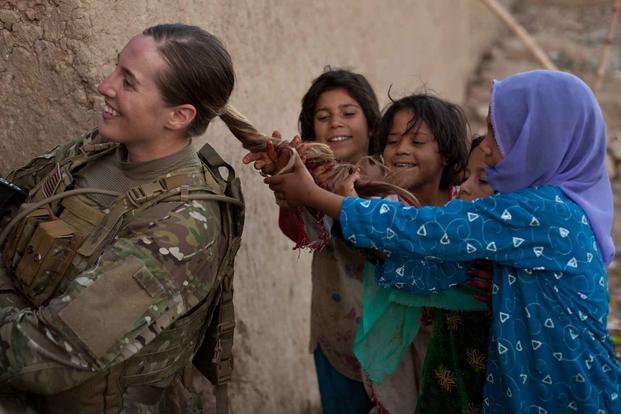
The services have been publicly pushing for policies that would make women feel more welcome in the ranks, including updates to long-standing hair rules that have been particularly problematic for women of color, and had to be flatly ignored by many wearing helmets.
But despite changes to regulations, women continue to have men in their units incorrectly police their hairstyles. It's a microcosm for how the services are still grappling with how to effectively support women in uniform.
In this story, Military.com spoke to women who were routinely pestered, in some instances by lower-ranking soldiers, over their hairstyles.
"I think it's an older generation not wanting to conform to change," one soldier told Military.com
-- Zachary Fryer-Biggs is the managing editor at Military.com.
